The first ever Asia Regional Consultation on MSM HIV/AIDS Care and Support was held in Bangkok from 17-20 November. Co-sponsored by USAID (United States Agency for International Development), UNDP (United Nations Development Program), and organised by FHI (Family Health International), the landmark meeting was attended by over 90 people from 12 countries including China, India, Hong Kong, Laos, Nepal, the Philippines, Singapore and Thailand, comprising representatives from community based organisations, government public health officials, technical advisors, and funding agencies such as the Bill and Melinda Gates Foundation and Clinton Foundation.
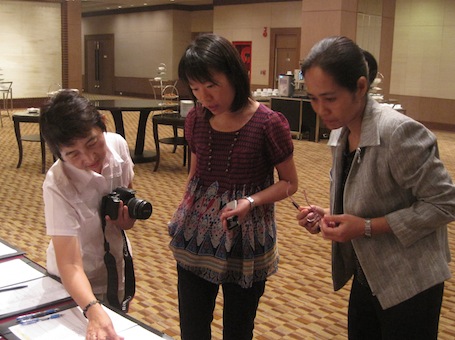
Loretta Chen, Chief Executive Aids Concern (Hong Kong)
Care and support for MSM (men-who-have-sex-with-men) and TG (transgenders) with HIV/AIDS is an essential component of the HIV “Continuum of Care”, which comprises Prevention, Testing, Treatment, and Care & Support. Any effective HIV prevention strategy must also address the critical role that people living with HIV/AIDS (PLHA) play. There is a concerted effort region-wide for MSM and TG to get a regular HIV test, and as more people test positive, it is necessary to rapidly scale up treatment programs and support services to meet their needs.
Frits van Griensven from Thailand’s Ministry of Public Health-U.S Centers for Disease Control & Prevention Collaboration reported that the burden of infection weighs heavily on Asian MSM, with Bangkok suffering the highest HIV prevalence in the region. The number of new infections is still climbing in Singapore and Japan. However there was good news from Hong Kong and Taiwan where new infections had decreased – a promising outcome for these countries whose governments actively reach out to the gay community.
The same cannot be said for India, which suffers from high prevalence rates, as does its neighbour China whose epidemic is said to be “taking off” in several cities. Van Griensven also forewarned of a “gathering storm” in the Philippines where a worryingly dramatic increase in new infections has been observed in recent data.
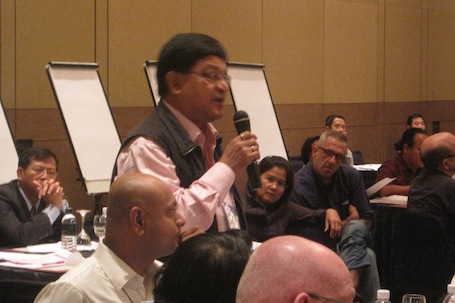
Ashok Row Kavi, Founder Humsafar Trust (India)
The situation for transgender people is much worse with Van Griensven explaining that HIV prevalence among this group reached a high of 34% in Jakarta. A similar situation is likely in other countries however comprehensive data on transgender people is unfortunately scant. Insufficient health services and languid political will pose further barriers for transgender people (TG) to receive proper care and support.
As stories and experiences were shared over the course of the three-day meeting several recurring themes surfaced.
Reports from city after city painted similar pictures: limited resources exist for the needs of gay men, MSM and TG; the few services that do exist are only being accessed by a fraction of the people who need them; and finally, stigma and discrimination still hover as dark clouds over the entire landscape.
The current mix of conventional national HIV programs often places greater emphasis on HIV prevention in the general population. That said, only a handful of Asian governments apportion some money and resources towards tackling HIV for gay men, other MSM and TG. Those that do have targeted programs still fall short in providing sufficient services for men and transgender people who are living with virus as was reported by David Lowe, consultant for the Australian government’s AusAID agency. This scenario creates a situation where people find out they are HIV-postive then left with little support to navigate the complex, and sometimes hostile, road of health monitoring and long-term treatment.
Lowe called for a paradigm shift, saying bluntly that “the current approaches aren’t working” and more lateral and unconventional strategies that focus on the specific needs of TG and MSM be adopted and fully implemented by governments.
There is hope that the World Health Organisation (WHO) will articulate what governments should do. Massimo Ghidinelli, Regional Adviser on HIV/AIDS and STI for the WHO, announced that an eagerly awaited document outlining the recommended package of basic services specifically for MSM and transgender people will be released in early 2010. This document is intended to set a benchmark for the bare minimum of service that any country should be providing. Consensus is that delivery of WHO recommendations are long overdue. However the reality is that the learning curve will be steep for many governments, especially those in developing countries or in places where anti-sodomy or homophobic laws are still in place. Perhaps the greatest obstacle for many countries will be to train their doctors, nurses and other health care professionals to be more sensitive and responsive to the needs of gay men, MSM and transgender people. This includes better guarantees for privacy and creating an environment where people can seek advice and treatment without fear of discrimination, abuse or violence.
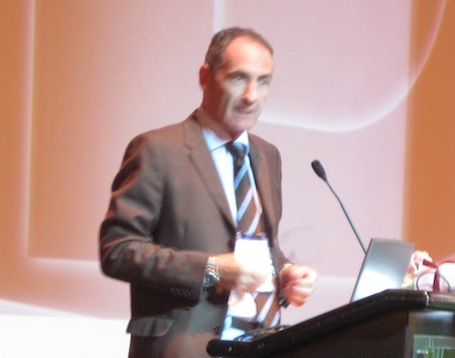
Massimo Ghidinelli, Regional Adviser on HIV/AIDS and STI for the WHO
The Asia-Pacific Network of People Living with HIV/AIDS (APN+) reported that 21.1% of HIV-positive MSM and TG surveyed last year were denied clinical services. In some cases these people were physically abused by health care professionals. APN+ also argued that the Asian health care system was very poor at respecting the privacy of its patients. The frequency of health care professionals divulging the HIV status and/or the sexuality of their patients without consent was alarming.
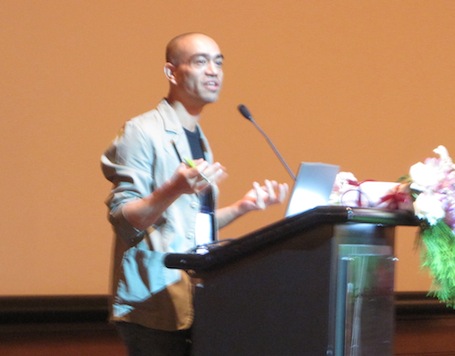
Shiba Phurailatpam, Regional Coordinator APN+
It is no wonder that fear is pervasive among gay men, MSM and TG when it comes to speaking openly about topics related to sexual health and the treatment of STIs. The unfortunate result is that the number of men and TG who come forward for treatment is disappointingly low.
Those with symptoms of infection often hesitate to get treatment. Trips to the clinic or hospital are often left to the last minute when an infection becomes acute or possibly fatal. It was widely agreed that one of the biggest failures in communication has been the low awareness that early detection of HIV and other STIs mean better chances of long-term health.
The issue of how to tackle these grim realities was the big question mark hovering over everyone’s heads. And pragmatic answer was that there was no quick fix – a smart and multifaceted approach was required with better cooperation between all stakeholders.
Kimberly Green, Regional Technical Advisor for HIV Care and Support from Family Health International (FHI) demonstrated how a holistic approach that encompassed care, support, treatment, HIV testing/counseling and prevention work has been implemented with some success at a local level. Better coordination between various health service providers, government agencies and community-based organisations was the key. Lessons learned from model projects in India, Cambodia and Nepal could pave the way for programs that can be expanded to a national level if sufficient backing and political determination were mustered.
Of equal significance was an example of MSM and HIV-positive MSM taking active roles in the provision of care and support, not only by providing counseling but also being trained to offer case management for patients as was reported by Jay Liu, from AIDS Care an NGO in China. Encouraging news was also brought from Cambodia where workshops for health care professionals to become more sensitive to the needs of MSM are already underway as part of their national HIV/AIDS action plan.
Innovations in the use of technology as part of a prevention, care and support strategy were also a source of optimism and new ideas during the meeting. Model programs, which used SMS-ing to provide counseling and information on STIs, were presented from Ghana and Indonesia.
Stuart Koe, founder and CEO of Fridae.com, gave a presentation on how the use of Internet technology can be harnessed to effectively reach the MSM and TG communities in Asia. Based on Fridae’s size estimations, the number of MSM who are accessing the Internet include 15 million in China, 1.2 million in Indonesia, 1 million in the Philippines and 700,00 in both Taiwan and Thailand. Preliminary data from the 2009 MSM Sex Survey was presented that showed the emerging trends of private sex parties and drug use. Fridae’s KYS (Know Your Status) program, which promotes the awareness of regular HIV testing and sends annual reminders to get tested, has reached over 30,000 people in 12 months. A post-campaign survey for Fridae’s 2006 “Think Again” campaign also showed an increase in condom use amongst respondents who had seen the campaign, compared to those who had not.
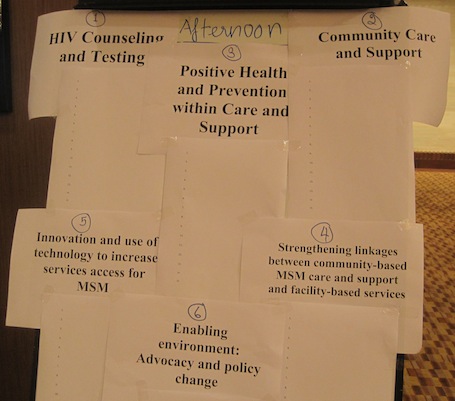
Small group breakouts
The Regional Consultation on MSM HIV Care and Support will result in a guidance document which includes strategies to increase access of key MSM sub-populations to a continuum of appropriate HIV testing and counseling, care, support and existing treatment services; key technical and programmatic approaches in the provision of community-based services for MSM living with HIV and their link with facility-based care, and defining complementing roles of community and health providers/systems in a Continuum of Care (CoC) for MSM which can be addressed by different partners.
The joint publication will outline consensus on the critical elements of HIV+ MSM care and support services in the region. Organisers expect to publish this report by the first quarter of 2010.











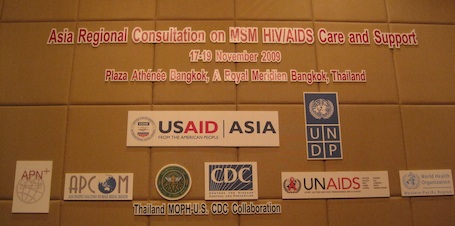
 列印版本
列印版本











讀者回應
請先登入再使用此功能。